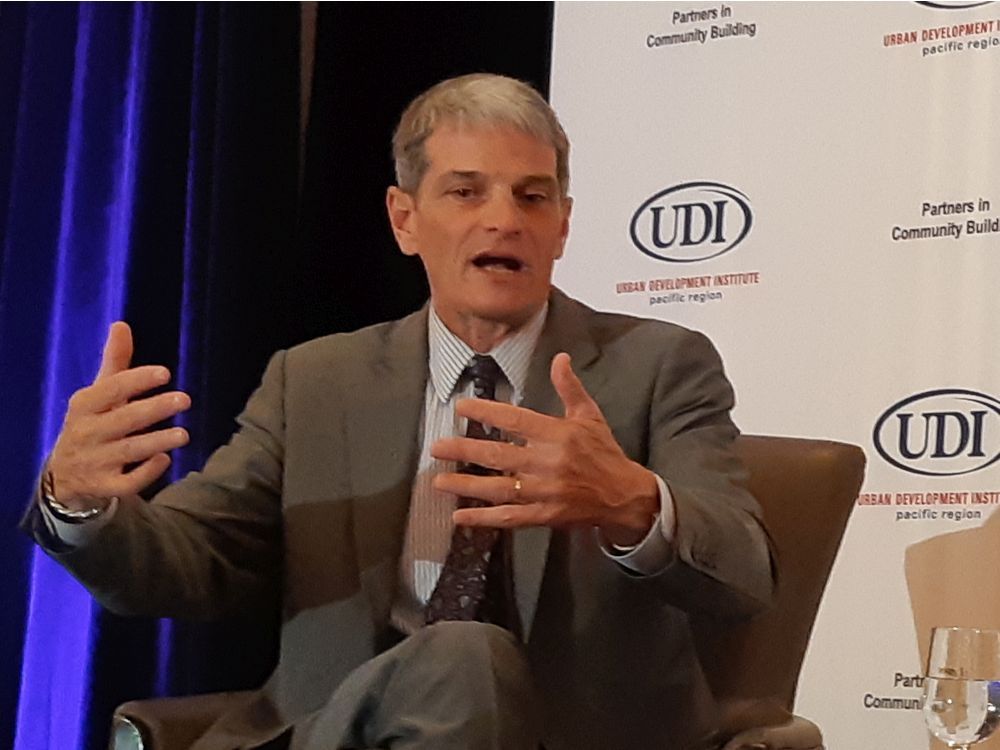TransLink CEO talks transit-oriented development in keynote

Credit to Author: Jennifer Saltman| Date: Tue, 08 Oct 2019 22:47:35 +0000
TransLink’s CEO believes Metro Vancouver needs to find new ways to finance major rapid-transit expansion projects, including partnerships with developers.
In a keynote address at an Urban Development Institute event on Tuesday, Kevin Desmond invited developers to work with TransLink to make the communities they build livable, walkable and transit-accessible.
“We can’t just do this on TransLink taxpayer-supported dollars,” Desmond said. “Getting that public transportation, getting that access in and out of your communities might mean that you’re going to have to roll up your sleeves and make that happen.”
During his speech, Desmond touted the region’s approach to transit-oriented development, which has seen thousands of units of housing, businesses and other amenities crop up along rapid transit routes. He described the amount of work being done around the SkyTrain guideways as “astonishing.”
Desmond said the idea of building near transit is not a new one, but it really took off in Metro Vancouver after the Canada Line started operating a decade ago. Marine Drive Station was the jumping-off point for modern transit-oriented development in the region, he said, and the work done around the station has helped to propel ridership, which continues to climb across the transit system.
“Smart land-use planning makes transit more effective and, conversely, excellent transit creates value for development projects because people want to live near high-quality transit,” Desmond said. “It is an incredibly simple equation.”
Also on the Canada Line, Desmond pointed out that developers have paid for a new station at Capstan Way in Richmond. Those building near the proposed station were entitled to bonus density in exchange for making contributions to the cost of the station. It is expected that construction could be started within the next 12 to 18 months.
“It’s going to support a very, very significant new development,” Desmond said.
Desmond said he sees potential in the areas around the region’s coming transit mega-projects, which he believes will be reshaped in the coming years.
Along the 5.7-kilometre Broadway subway extension, the City of Vancouver is creating a comprehensive area plan. Desmond said the line will be “a game changer,” and that TransLink is working closely with the city during its planning process.
“It will transform the community,” he said of the line. “I certainly hope and encourage that the city is going to get it right, that there’s going to be a great mix of opportunities, of housing types, of affordability types, along the Broadway corridor.”
The project is currently in the request-for-proposals stage. Construction could start by the end of next year.
Desmond said the second round of planning work — including land use — is under way to take the extension to the University of B.C.
In Surrey, Desmond said he believes a 16-kilometre SkyTrain line along Fraser Highway to Langley will be “a huge success.”
Within the current $1.6-billion budget, the line will only go to Fleetwood in the first stage, however Desmond said if upper levels of government commit to long-term funding for the project, which is estimated to cost $3.1 billion in its entirety, it could be built to Langley in the same amount of time.
It’s expected that the business case for the project will be completed by January and forwarded to TransLink’s Mayors’ Council and board of directors for approval. Then, it will be sent to the federal and provincial governments. If everything remains on schedule, SkyTrain to Fleetwood could be complete by 2025.
“There is indeed this symbiotic relationship between transportation planning and land-use planning,” Desmond said. “Let’s find the intersection between the two, that sweet spot where we’re really drive progress in the region.”